GIÚP EM BÀI 2,3 VỚI Ạ.EM CẦN GẤPPP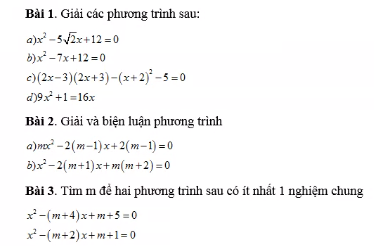
Hãy nhập câu hỏi của bạn vào đây, nếu là tài khoản VIP, bạn sẽ được ưu tiên trả lời.


Bài 2:
a, Do tam giác MNP cân tại M nên MN=MP
\(\Rightarrow\dfrac{1}{2}MN=\dfrac{1}{2}MP\Rightarrow MO=ON=MO'=O'P\)
\(\Rightarrow MO=OD=DO'=O'M\) (OD và O'D là các bán kính của (O) và (O'))
Do đó MODO' là hthoi
\(\Rightarrow\widehat{OMO'}=\widehat{ODO'}\)
Lại có \(ON=OD\Rightarrow\widehat{OND}=\widehat{ODN};DO'=O'P\Rightarrow\widehat{O'DP}=\widehat{O'PD}\)
\(\Rightarrow\widehat{NDP}=\widehat{NDO}+\widehat{ODO'}+\widehat{O'DP}=\widehat{OND}+\widehat{O'PD}+\widehat{OMO'}=180^0\)
Vậy \(\widehat{NDP}\) là góc bẹt hay N,D,P thẳng hàng
b, Vì \(\left\{{}\begin{matrix}MO=ON\\MO'=O'P\end{matrix}\right.\) nên OO' là đtb tg MNP
Do đó OO'//NP
Mà OO'⊥MD (hthoi MODO')
Suy ra NP⊥MD
Mà tam giác MNP cân tại M nên MD cũng là trung tuyến
\(\Rightarrow ND=DP\\ \Rightarrow\stackrel\frown{DN}=\stackrel\frown{DP}\)
c, Vì O'D là đtb tg MNP nên O'D//OE hay OO'DE là hình thang
Mà OD=O'E (do là bán kính 2 đg tròn (O) và (O')) nên OO'DE là htc
Do đó OO'DE nội tiếp
\(\Rightarrow\widehat{O'OD}=\widehat{O'ED}\) (cùng chắn O'D)
Mà tam giác OO'D và O'ED cân tại D và O' nên \(\widehat{EO'D}=\widehat{ODO'}\left(180^0-2\widehat{O'OD}=180^0-2\widehat{O'ED}\right)\)
Mà \(\widehat{OMO'}=\widehat{ODO'}\Rightarrow\widehat{OMO'}=\widehat{EO'D}\)
Mà \(\widehat{OMO'}=\widehat{DO'P}\) (đồng vị) \(\Rightarrow\widehat{DO'P}=\widehat{EO'D}\)
\(\Rightarrow\stackrel\frown{ED}=\stackrel\frown{DP}\) hay ta đc đpcm

\(1,\\ A=\left(2\sqrt{6}-4\sqrt{3}-\sqrt{6}\right)\cdot\sqrt{6}+12\sqrt{2}\\ A=6-12\sqrt{2}+12\sqrt{2}=6\\ B=\left(\dfrac{\sqrt{5}}{5}-\dfrac{4\sqrt{5}}{5}+\sqrt{5}\right):2\sqrt{5}\\ B=\dfrac{1}{10}-\dfrac{2}{5}+\dfrac{1}{2}=\dfrac{1}{5}\\ C=\sqrt{21+12\sqrt{3}}-\sqrt{21-12\sqrt{3}}\\ C=\sqrt{\left(2\sqrt{3}+3\right)^2}-\sqrt{\left(2\sqrt{3}-3\right)^2}\\ C=2\sqrt{3}+3-2\sqrt{3}+3=6\)
\(2,\\ a,A=\dfrac{x+\sqrt{x}+3\sqrt{x}-3-6\sqrt{x}+4}{\left(\sqrt{x}-1\right)\left(\sqrt{x}+1\right)}\\ A=\dfrac{x-2\sqrt{x}+1}{\left(\sqrt{x}-1\right)\left(\sqrt{x}+1\right)}=\dfrac{\left(\sqrt{x}-1\right)^2}{\left(\sqrt{x}-1\right)\left(\sqrt{x}+1\right)}=\dfrac{\sqrt{x}-1}{\sqrt{x}+1}\\ b,x=7-2\sqrt{6}\Leftrightarrow\sqrt{x}=\sqrt{6}-1\\ \Leftrightarrow A=\dfrac{\sqrt{6}-1-1}{\sqrt{6}+1-1}=\dfrac{\sqrt{6}-2}{\sqrt{6}}=\dfrac{6-2\sqrt{6}}{6}=\dfrac{3-\sqrt{6}}{3}\\ A=\dfrac{\sqrt{x}-1}{\sqrt{x}+1}=1-\dfrac{2}{\sqrt{x}+1}\\ Ta.có.\sqrt{x}+1\ge1\Leftrightarrow\dfrac{2}{\sqrt{x}+1}\le2\\ \Leftrightarrow1-\dfrac{2}{\sqrt{x}-1}\ge1-2=-1\\ A_{min}=-1\Leftrightarrow x=0\)
\(3,\\ a,ĐK:x\ge\dfrac{1}{3}\\ PT\Leftrightarrow6x-2=16\Leftrightarrow x=3\left(tm\right)\\ b,ĐK:x\ge2\\ PT\Leftrightarrow\dfrac{1}{3}\sqrt{x-2}-\dfrac{2}{3}\cdot3\sqrt{x-2}+6\cdot\dfrac{1}{9}\sqrt{x-2}=-4\\ \Leftrightarrow-\sqrt{x-2}=-4\\ \Leftrightarrow\sqrt{x-2}=4\Leftrightarrow x-2=16\Leftrightarrow x=18\left(tm\right)\\ c,ĐK:x\ge0\\ PT\Leftrightarrow\left|3x+2\right|=4x\Leftrightarrow\left[{}\begin{matrix}3x+2=4x\left(x\ge-\dfrac{2}{3}\right)\\3x+2=-4x\left(x< -\dfrac{2}{3}\right)\end{matrix}\right.\Leftrightarrow\left[{}\begin{matrix}x=2\\KTMĐKXĐ\end{matrix}\right.\)
\(d,ĐK:x\ge1\\ PT\Leftrightarrow x-2\sqrt{x-1}=x-1\\ \Leftrightarrow2\sqrt{x-1}=1\Leftrightarrow\sqrt{x-1}=\dfrac{1}{2}\\ \Leftrightarrow x-1=\dfrac{1}{4}\Leftrightarrow x=\dfrac{5}{4}\)

Bài 7:
a: Xét ΔDEF có \(EF^2=DE^2+DF^2\)
nên ΔDEF vuông tại D
b: \(DK=\dfrac{DE\cdot DF}{EF}=4.8\left(cm\right)\)
FK=6.4(cm)


Em tách ra 1-2 bài/1 câu hỏi để mọi người hỗ trợ nhanh nhất nha!
Bài 3:
a: Ta có: \(B=\left(\dfrac{\sqrt{x}}{\sqrt{x}-1}+\dfrac{\sqrt{x}}{x-1}\right):\left(\dfrac{2}{x}-\dfrac{2-x}{x\left(\sqrt{x}+1\right)}\right)\)
\(=\dfrac{x+2\sqrt{x}}{\left(\sqrt{x}-1\right)\left(\sqrt{x}+1\right)}:\dfrac{2\sqrt{x}+2-2+x}{x\left(\sqrt{x}+1\right)}\)
\(=\dfrac{x}{\sqrt{x}-1}\)


\(a,\Leftrightarrow\left\{{}\begin{matrix}8x+12y=16\\8x+12y=-3\end{matrix}\right.\Leftrightarrow HPT.vô.nghiệm\\ b,\Leftrightarrow\left\{{}\begin{matrix}2x-2y+6x+3y=5\\5x+5y-4x+2y=2\end{matrix}\right.\Leftrightarrow\left\{{}\begin{matrix}8x+y=5\\x+7y=2\end{matrix}\right.\\ \Leftrightarrow\left\{{}\begin{matrix}56x+7y=35\\x+7y=2\end{matrix}\right.\Leftrightarrow\left\{{}\begin{matrix}x=\dfrac{3}{5}\\y=\dfrac{1}{5}\end{matrix}\right.\\ c,\Leftrightarrow\left\{{}\begin{matrix}\dfrac{x}{6}+\dfrac{y}{8}=\dfrac{5}{2}\\\dfrac{x}{6}+\dfrac{y}{9}=\dfrac{2}{3}\end{matrix}\right.\Leftrightarrow\left\{{}\begin{matrix}\dfrac{x}{2}+\left(-\dfrac{11}{18}\right)=2\\y=\dfrac{2}{3}-\dfrac{5}{2}=-\dfrac{11}{6}\end{matrix}\right.\\ \Leftrightarrow\left\{{}\begin{matrix}x=\dfrac{47}{9}\\y=-\dfrac{11}{6}\end{matrix}\right.\)
\(d,ĐK:x\ne-2;y\ne1\\ HPT\Leftrightarrow\left\{{}\begin{matrix}\dfrac{2}{x+2}-\dfrac{6}{y-1}=4\\\dfrac{2}{x+2}+\dfrac{2}{y-1}=5\end{matrix}\right.\Leftrightarrow\left\{{}\begin{matrix}\dfrac{1}{x+2}-\dfrac{3}{y-1}=2\\\dfrac{8}{y-1}=1\end{matrix}\right.\\ \Leftrightarrow\left\{{}\begin{matrix}\dfrac{1}{x+2}=2+\dfrac{3}{8}=\dfrac{19}{8}\\y=9\end{matrix}\right.\Leftrightarrow\left\{{}\begin{matrix}x=-\dfrac{30}{19}\\y=9\end{matrix}\right.\)
\(e,\Leftrightarrow\left\{{}\begin{matrix}x^2=4-y^2\\3\left(4-y^2\right)-2y^2=3\end{matrix}\right.\Leftrightarrow\left\{{}\begin{matrix}x^2=4-y^2\\12-5y^2=3\end{matrix}\right.\\ \Leftrightarrow\left\{{}\begin{matrix}x^2=4-y^2\\y^2=\dfrac{9}{5}\end{matrix}\right.\Leftrightarrow\left\{{}\begin{matrix}x^2=\dfrac{11}{5}\\y^2=\dfrac{9}{5}\end{matrix}\right.\)
Vậy hpt có nghiệm \(\left(x;y\right)=\left\{\left(\pm\dfrac{\sqrt{55}}{5};\pm\dfrac{3\sqrt{5}}{5}\right)\right\}\)

Phương trình hoành độ giao điểm là:
\(x^2-2mx+m^2-m=0\)
a: Để (P) cắt (d) tại hai điểm phân biệt thì \(\left(-2m\right)^2-4\left(m^2-m\right)>0\)
=>4m>0
hay m>0
b: Để (P) cắt (d) tại hai điểm nằm về hai phía của trục tung thì \(m^2-m< 0\)
=>0<m<1

Bài 2:
a: Xét (O) có
CM là tiếp tuyến có M là tiếp điểm
CA là tiếp tuyến có A là tiếp điểm
Do đó: CM=CA
Xét (O) có
DM là tiếp tuyến có M là tiếp điểm
DB là tiếp tuyến có B là tiếp điểm
Do đó: DM=DB
Ta có: CM+MD=CD
mà CM=CA
và DM=DB
nên CD=CA+DB
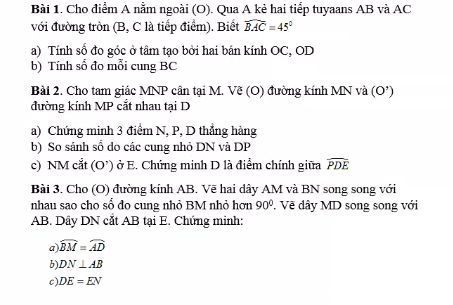
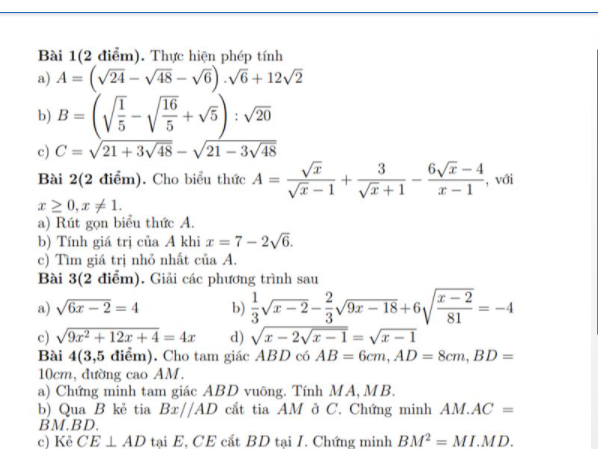
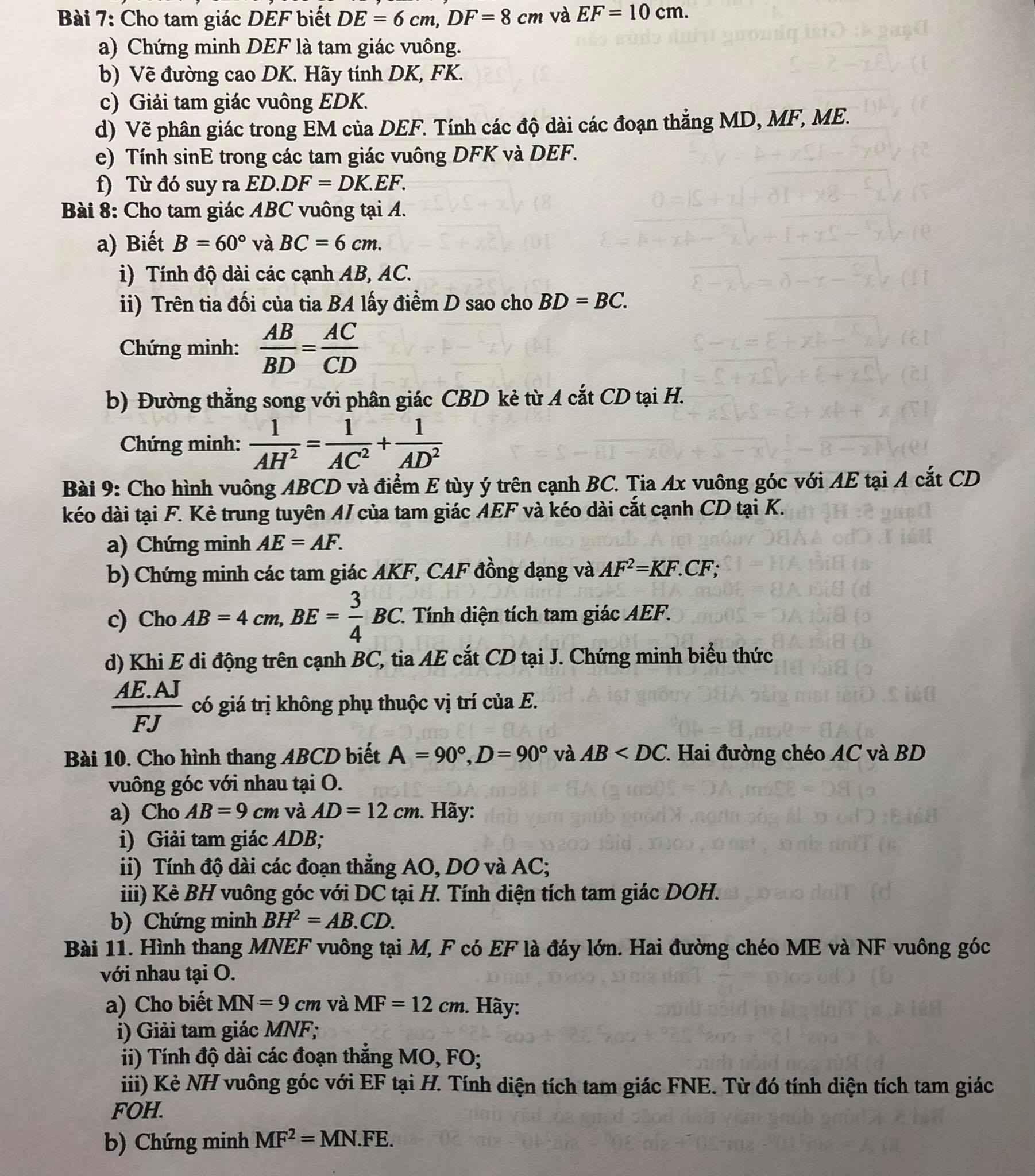
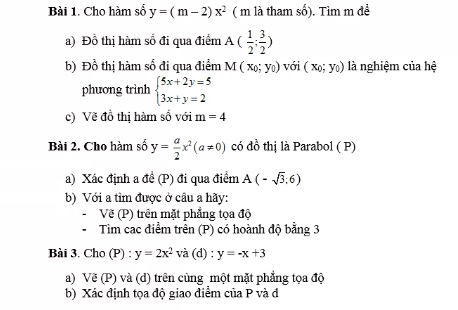 PP
PP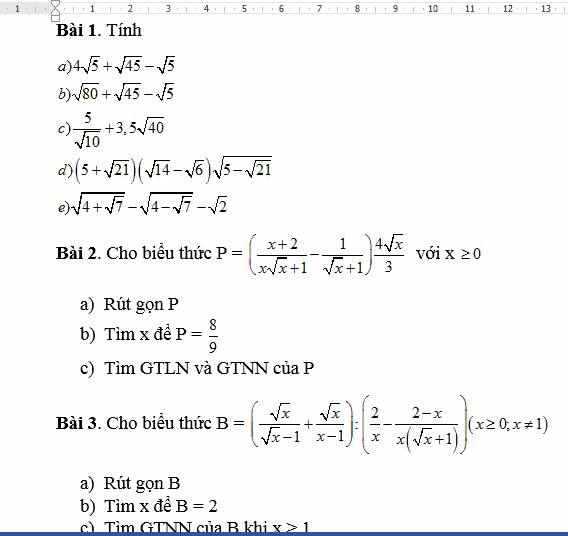
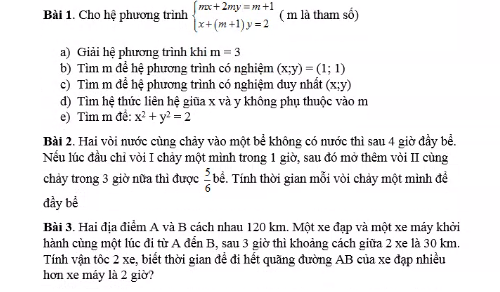
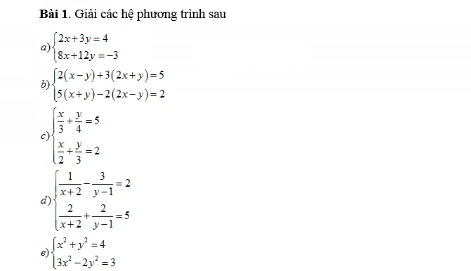

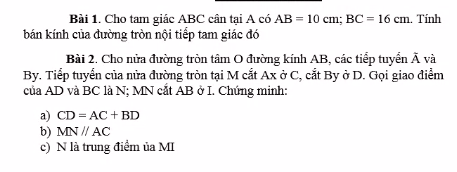
Bài 2:
\(b,\Delta=4\left(m+1\right)^2-4m\left(m+2\right)\\ =4m^2+8m+4-4m^2-8m=4>0,\forall m\)
Vậy PT có 2 nghiệm phân biệt với mọi m
Khi đó \(\left[{}\begin{matrix}x=\dfrac{2\left(m+1\right)-2}{2}=m\\x=\dfrac{2\left(m+1\right)+1}{2}=m+2\end{matrix}\right.\)
Bài 3:
Gọi nghiệm chung 2 PT là \(x_1\)
\(\Leftrightarrow\left\{{}\begin{matrix}x_1^2-\left(m+4\right)x_1+m+5=0\left(1\right)\\x_1^2-\left(m+2\right)x_1+m+1=0\left(2\right)\end{matrix}\right.\\ \Leftrightarrow\left(1\right)-\left(2\right)=-\left(m+4\right)x_1+m+5+\left(m+2\right)x_1-m-1=0\\ \Leftrightarrow x_1\left(-m-4+m+2\right)+4=0\\ \Leftrightarrow-2x_1=-4\Leftrightarrow x_1=-2\)
Thay \(x_1=-2\) vào \(\left(2\right)\Leftrightarrow4+2\left(m+2\right)+m+1=0\)
\(\Leftrightarrow3m+9=0\Leftrightarrow m=-3\)
Bài 2:
\(a,\forall m=0\\ PT\Leftrightarrow-2\left(m-1\right)x=-2\left(m-1\right)\Leftrightarrow x=1\\ \forall m\ne0\\ \Delta=4\left(m-1\right)^2-8m\left(m-1\right)\\ =4m^2-8m+4-8m^2+8m\\ =4-4m^2\)
PT vô nghiệm \(\Leftrightarrow4-4m^2< 0\Leftrightarrow m^2>1\Leftrightarrow\left[{}\begin{matrix}m>1\\m< -1\end{matrix}\right.\)
PT có nghiệm kép \(\Leftrightarrow4-4m^2=0\Leftrightarrow\left(1-m\right)\left(1+m\right)=0\Leftrightarrow\left[{}\begin{matrix}m=1\\m=-1\end{matrix}\right.\)
Khi đó \(x=\dfrac{2\left(m-1\right)}{2m}=\dfrac{m-1}{m}\)
PT có 2 nghiệm phân biệt \(\Leftrightarrow4-4m^2>0\Leftrightarrow-1< m< 1;m\ne0\)
Khi đó \(x=\dfrac{2\left(m-1\right)\pm\sqrt{4-4m^2}}{2m}=\dfrac{2\left(m-1\right)\pm2\sqrt{1-m^2}}{2m}=\dfrac{m-1\pm\sqrt{1-m^2}}{2}\)